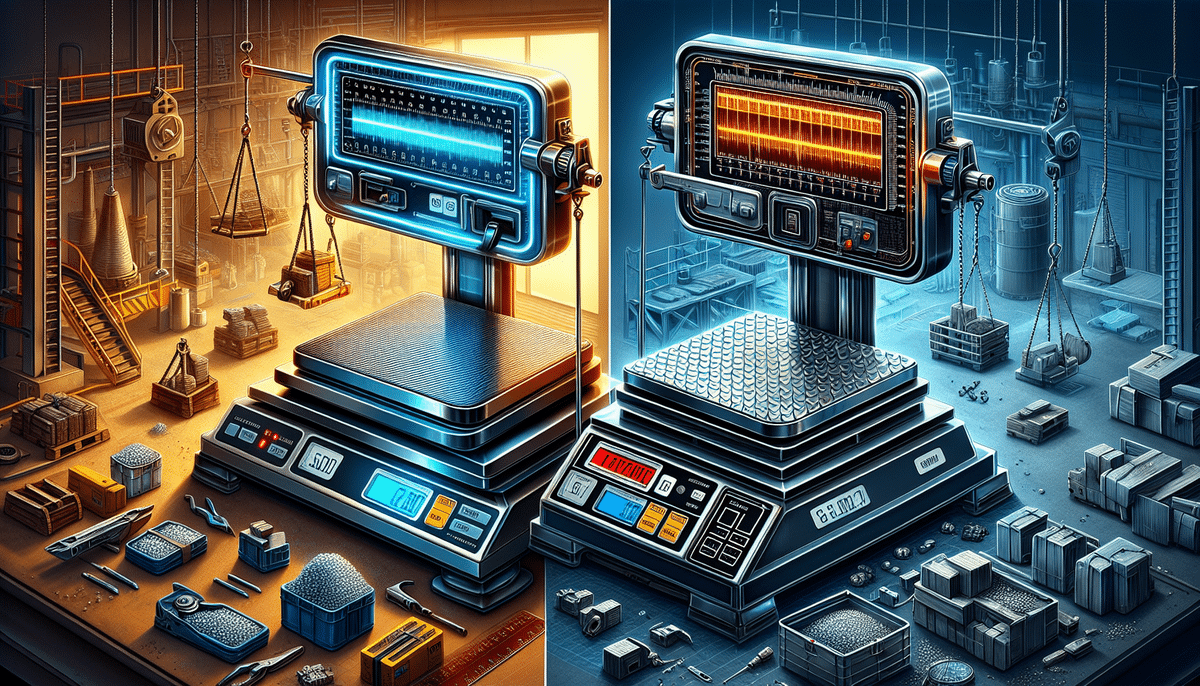Adam Equipment CPWplus vs Rice Lake RoughDeck: Comprehensive Scale Comparison
When it comes to weighing equipment, businesses have a plethora of brands and models to choose from. Two standout options that frequently emerge in discussions are the Adam Equipment CPWplus and the Rice Lake RoughDeck. This article provides an in-depth comparison of these two scales, exploring their technical specifications, load capacity, accuracy, durability, ease of use, customer feedback, and pricing. We will also examine their applications across various industries, maintenance and calibration procedures, and offer troubleshooting tips. By the end of this guide, you'll be equipped with the knowledge to determine which scale best suits your business needs.
Overview of Adam Equipment CPWplus and Rice Lake RoughDeck
The Adam Equipment CPWplus is a versatile scale designed to accommodate a wide range of applications. Key features include:
- Platform Material: Stainless steel for durability and easy cleaning.
- Display: Large, backlit display for clear readability.
- Power Options: Rechargeable battery offering up to 90 hours of use, enhancing mobility for on-the-go businesses.
In contrast, the Rice Lake RoughDeck is renowned for its robustness and precision, making it a favorite among businesses requiring reliable weighing solutions. Notable features include:
- Platform Material: Steel with a diamond plate surface, ensuring excellent traction in wet or oily conditions.
- Display: Customizable large display for viewing weight, units, and other pertinent information.
- Capacity: Handles up to 20,000 lbs, catering to heavy-duty industrial needs.
Both scales offer a range of features tailored to different business requirements. The CPWplus boasts a built-in RS-232 interface for seamless data transfer, while the RoughDeck can be accessorized with ramps and pit frames to meet specific operational demands. The optimal choice hinges on your business’s unique requirements.
Technical Specifications
Adam Equipment CPWplus Specifications
- Capacity Range: 70 lbs to 3,300 lbs
- Accuracy: ±0.1% of the applied load
- Weighing Modes: Parts counting, hold function, percentage weighing
- Power Sources: AC adapter or rechargeable battery
Rice Lake RoughDeck Specifications
- Capacity Range: 1,000 lbs to 20,000 lbs
- Accuracy: ±0.25% of the applied load
- Features: Programmable setpoint, configurable analog output
- Power Sources: AC adapter or four AA batteries, with an optional rechargeable battery
Additionally, the CPWplus features a stainless steel platform with adjustable feet for leveling, whereas the RoughDeck's steel frame and diamond plate deck offer a rugged surface suitable for heavy-duty operations. Both scales support various accessories like ramps and remote displays, making them adaptable to different industrial environments.
Load Capacity Comparison
Load capacity is a critical factor when selecting a scale:
- Adam Equipment CPWplus: Maximum capacity of 3,300 lbs, suitable for weighing smaller items in industries like laboratories and food service.
- Rice Lake RoughDeck: Maximum capacity of 20,000 lbs, ideal for heavy-duty applications in construction and agriculture.
The RoughDeck's higher capacity accommodates larger and heavier loads, whereas the CPWplus offers greater precision with a readability of 0.5 lbs compared to the RoughDeck’s 2 lbs readability. This makes the CPWplus more suitable for applications requiring meticulous measurement.
Accuracy Comparison
Accuracy is paramount for ensuring reliable measurements:
- CPWplus: ±0.1% accuracy, providing precise measurements essential for detailed weighing tasks.
- RoughDeck: ±0.25% accuracy, which, while slightly less precise, is sufficient for applications where high capacity is more critical than minute precision.
Environmental factors such as temperature, humidity, and vibration can influence scale accuracy. Regular calibration and proper usage are essential to maintain accuracy for both models.
Durability Comparison
Durability ensures the longevity and reliability of the scale:
- CPWplus: Constructed with stainless steel and a rugged ABS housing, it resists corrosion and damage from spills or impacts.
- RoughDeck: Features a steel frame with a diamond plate deck, offering superior durability and traction, especially in harsh environments.
The RoughDeck's design is particularly advantageous for industries that demand robust equipment capable of withstanding heavy use and exposure to the elements.
Ease of Use
Both scales are engineered for user-friendliness:
- CPWplus: Portable design with a rechargeable battery enhances mobility. The intuitive interface and multiple weighing modes simplify operation.
- RoughDeck: The diamond plate surface facilitates usage in challenging conditions. Its large, customizable display ensures clarity in various environments.
The choice between them may depend on the specific operational context—whether mobility or surface traction is a higher priority.
Customer Reviews and Feedback
Customer insights provide valuable perspectives on product performance:
- CPWplus: Praised for its accuracy, durability, and ease of use. Many users highlight its excellent value for the price.
- RoughDeck: Commended for its rugged build and reliability. Some users mention challenges with assembly and setup.
Positive feedback underscores the reliability of both scales, but potential assembly difficulties with the RoughDeck may influence purchasing decisions for businesses with limited resources.
Price Comparison
Budget considerations play a significant role in scale selection:
- CPWplus: Generally available at a lower price point, making it an attractive option for businesses with budget constraints.
- RoughDeck: Higher initial investment, but its extensive capacity and durability may offer better long-term value for heavy-duty applications.
Businesses should weigh the upfront costs against the long-term benefits when choosing between these two scales.
Choosing Between Adam Equipment CPWplus and Rice Lake RoughDeck
The decision between the CPWplus and the RoughDeck hinges on several factors:
- Load Capacity: Choose the RoughDeck for higher capacity needs.
- Accuracy: Opt for the CPWplus when precision is crucial.
- Durability: The RoughDeck is preferable for harsh environments.
- Budget: The CPWplus offers a cost-effective solution for smaller-scale operations.
Assessing your business's specific requirements across these dimensions will guide you to the most suitable scale.
Applications in Various Industries
Both scales serve diverse industries, tailored to their unique needs:
- Adam Equipment CPWplus: Ideal for laboratories, food service, shipping, and environments requiring precise measurements.
- Rice Lake RoughDeck: Suited for construction, agriculture, manufacturing, and any setting that demands high-capacity and durable weighing solutions.
Warehouses and distribution centers can benefit from both, depending on their specific operational requirements.
Maintenance Tips
Proper maintenance ensures the longevity and accuracy of your scale:
- Regularly clean the platform to remove dust, debris, and contaminants.
- Calibrate the scale periodically as per the manufacturer's guidelines.
- Inspect for any physical damage and address issues promptly.
- Keep detailed records of all maintenance and calibration activities.
Adhering to these maintenance practices will help in sustaining optimal performance.
Calibration Procedures
Calibrating your scale is essential for maintaining accuracy:
- Refer to the manufacturer's instructions specific to the CPWplus or RoughDeck.
- Use certified calibration weights and follow the prescribed procedures.
- Perform calibration regularly and after any incidents that might affect accuracy, such as dropping the scale or exposure to extreme conditions.
Consistent calibration minimizes measurement errors and ensures reliable weighing results.
Troubleshooting Common Issues
Addressing scale issues promptly can prevent operational disruptions:
- Inaccurate Readings: Check calibration, ensure the scale is on a flat surface, and inspect for any physical obstructions.
- Display Errors: Verify power connections, replace batteries if necessary, and consult the user manual for specific error codes.
- Function Malfunctions: Restart the scale, update firmware if applicable, and contact customer support for persistent issues.
Utilizing the manufacturer's troubleshooting guide and seeking professional support when needed can effectively resolve most problems.
Conclusion: Which Scale is Right for Your Business?
Both the Adam Equipment CPWplus and the Rice Lake RoughDeck offer reliable and accurate weighing solutions tailored to different business needs. Your choice should be guided by factors such as:
- Load Capacity Requirements: RoughDeck for high-capacity needs; CPWplus for moderate to high but lower than RoughDeck.
- Accuracy Needs: CPWplus provides higher precision.
- Environmental Conditions: RoughDeck excels in harsh, industrial settings.
- Budget Constraints: CPWplus is more cost-effective for budget-conscious businesses.
Ultimately, the right scale will align with your specific operational demands, ensuring efficiency and reliability in your weighing processes. Remember to maintain and calibrate your scale regularly to uphold its performance and longevity.








